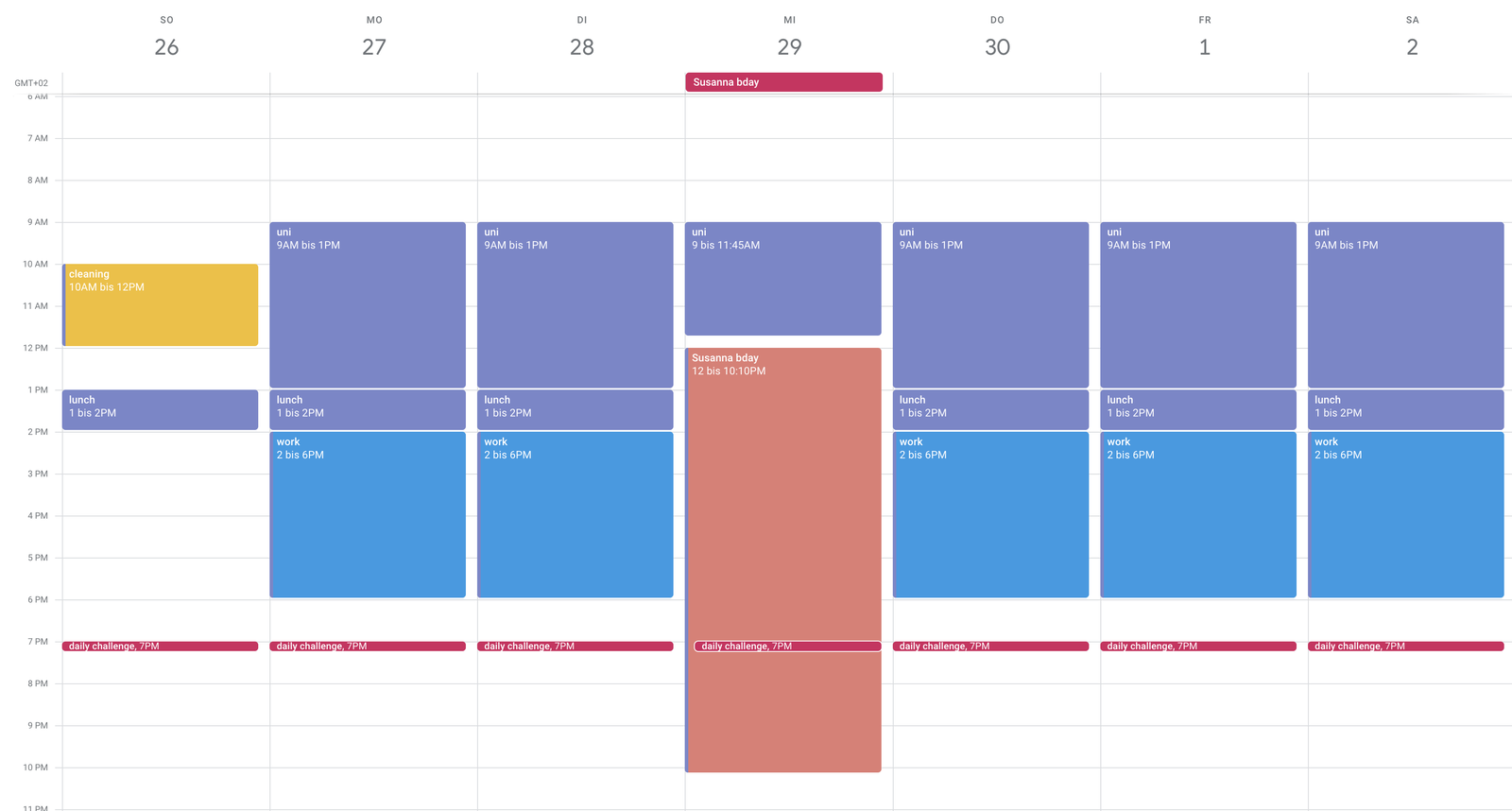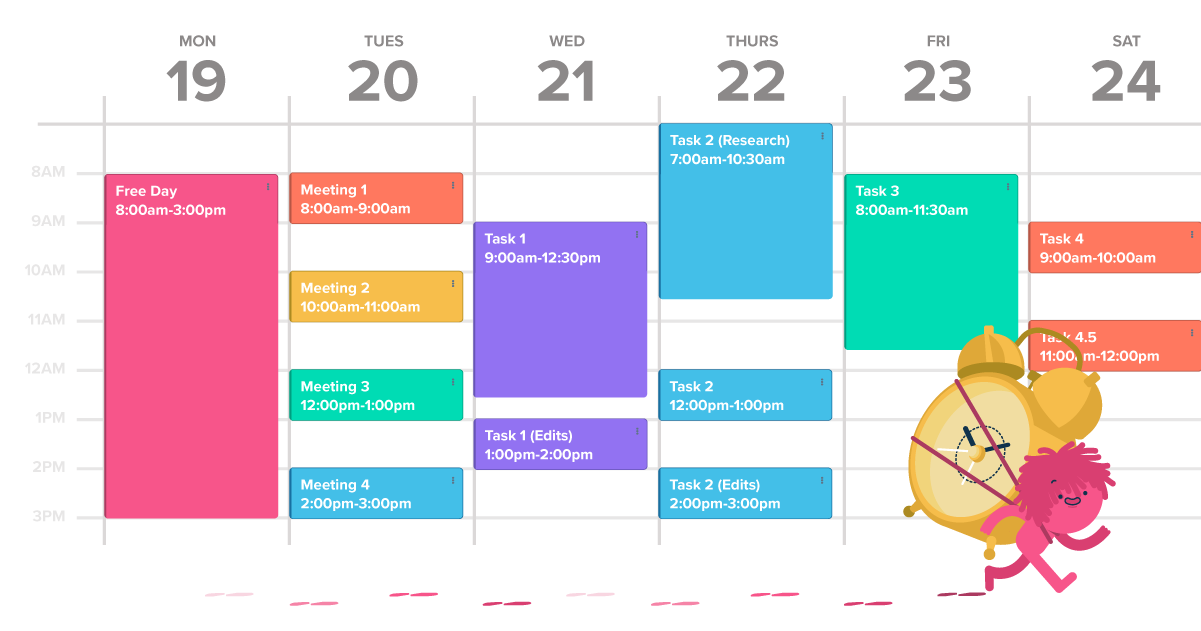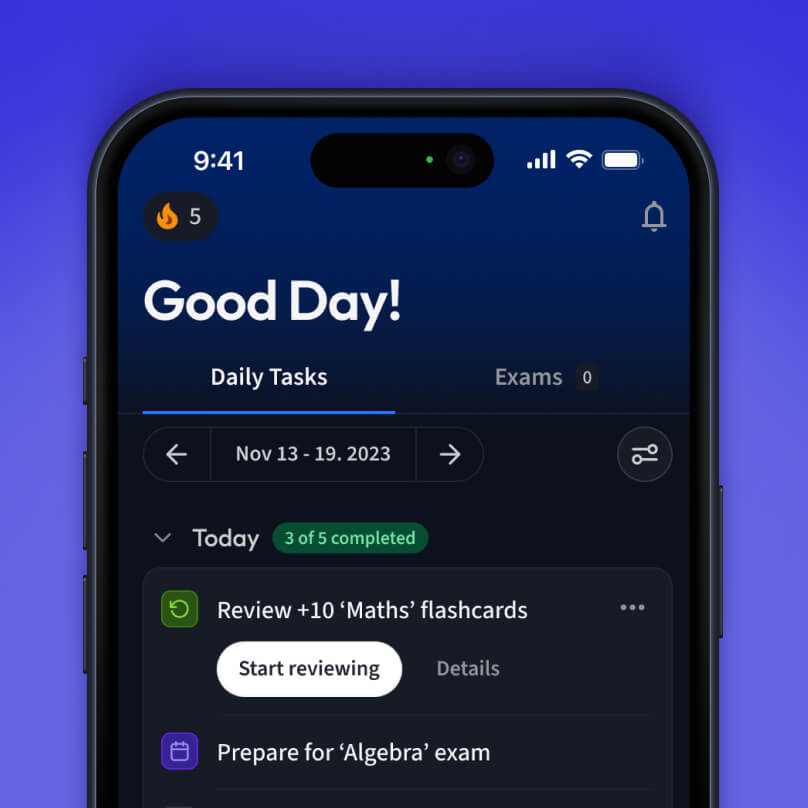What is Time Blocking?
Time blocking is a way to be more productive. It helps you plan your schedule by giving you time to do different things. This approach helps you better manage your time, improve focus, and improve overall productivity. You can achieve this by dedicating blocks of time to specific activities, such as studying, working on projects, or personal development.
Time Block
A time block is a period of time that is dedicated to a particular task or activity. You can stay in control of your schedule and be more productive if you schedule specific times for studying, doing assignments, or working on your projects. Here are three examples of time blocking in action:
Study Sessions 8:00 AM – 10:00 AM.
Work Projects 1:00 PM – 3:00 PM
Personal Development 5:30 PM – 6:30 PM
Daily Planning
Effective daily planning is crucial for successful time blocking. Here are some practical tips to make the most out of this technique:
- Start with a clear overview: List all the tasks and activities you need to accomplish for the day/week.
- Assign time blocks: Assign specific time slots for each task based on priority and estimated time needed.
- Be realistic: Consider the time required for each task and allow for breaks or unexpected events.
- Minimize distractions: During time blocks, eliminate distractions by turning off notifications, closing unnecessary tabs, and creating a focused work environment.
- Review and adjust: Regularly assess your progress and adjust time blocks if required. Flexibility is key to accommodating changes and unforeseen circumstances.
Apps for Time Blocking
There are plenty of apps out there, claiming to help you be more productive and more. For simple time blocking, you don’t need an army of apps. Therefore, here are my favourite apps for productive time blocking.
- Google Calendar: Let’s start with my favourite app. You can use every calendar app on your phone as well. For me, Google is perfect. All my emails are from Google and my work email as well.
- Notes App: I use my notes app as a universal notebook, and it’s the base of my second Brain. Therefore, everything I have to do is in there, I only have to assign it to time blocks in my calendar.
- Flow: It is a Pomodoro Timer and the Free Plan is kinda nice. But it helps me to implement the technique in my Time Blocking.
- Bonus: It’s not an app. I am pretty sure there are some out there. But I use the Focus function on my phone. I have different ones: Don’t disturb (only my family can call me), work (you can call and message me, but some apps are ‘locked’), sleep (apps are locked, messages are quiet, but you can call me) and me-time (no messages and some apps are ‘locked’). It is very helpful not to doom scroll.^^
Time Blocking Template
Giving a template is tricky because the biggest advantage of Time Blocking is flexibility. But to give you an idea of how it looks, I provide a screenshot of my calendar from the time I wrote my Master’s thesis and had a part-time job.

Example of time blocking. A week from the author during her master’s thesis.
As you can see, I use different colours for a better overview. I blocked two hours each Sunday to clean my flat and do laundry. The morning blocks in purple were for my master’s thesis and the blue blocks for work. I even blocked lunch (I would have been forgetting it otherwise).
In this week, I also blocked the Wednesday because a good friend celebrated her birthday 😀 And because my boyfriend was sick with Covid, we had a Google meet for our daily GeoGuessr Challenge (you should try it. It’s fun).
That would be an example of time blocking. You can use it as a template if you are working part-time and writing a thesis or a term paper 😉
Benefits of Time Blocking
Implementing time blocking can yield numerous benefits in terms of productivity and time management. Some notable advantages include:
- Improved Focus: By allocating dedicated time blocks for specific tasks, you minimize distractions and improve your ability to concentrate on the task at hand.
- Increased Productivity: Time blocking helps you prioritize tasks, ensuring important activities are completed efficiently and on time.
- Enhanced Time Management: By planning your day in advance and allocating specific time slots for each task, you gain better control over your schedule and utilize your time more effectively.
- Reduced Procrastination: Breaking tasks into manageable blocks and assigning them specific time slots creates a sense of urgency, reducing the tendency to procrastinate.
- Flexibility: Thanks to this scheme, you know exactly when you have to do your things. This allows you to take off the evenings and spend time with family and friends, or yourself. Even unexpected events can be easily included.
Some Tips at the End
- Implement it in your day-to-day life. Every time someone asks you if you have time for film night, you can check your calendar and instantly add it to block the time for your friends.
- Colour Code: The Google Calendar can be colour coded. So assign colours to specific tasks. Do you work part-time? Make it blue. Your courses can be purple. Do you need 2 hours a day for an essay? Make it green. You got it.
- Don’t be too strict. Time blocking should support you in your time management and organising. Do not restrict your life. Breaks, time for yourself, friends and family are important for your mental health. Don’t forget that.
- Adjust if necessary. Do you need more time to complete the assignment? Don’t stress yourself and adjust your time blocks. Or have you finished the homework earlier than expected? Nice, use the time for yourself or adjust it to have more time for something else.
Good Riddance!
Frequently Asked Questions (F.A.Qs)
Time blocking is a method to organise your life. You can better manage all your to-dos and responsibilities through colour-coded blocks in your calendar. Through this productivity method, you divide your weeks into smaller chunks, with this it is less overwhelming and more structured. It is an uncomplicated method for students and pupils.
An easy example of time blocking would look like this: Monday 7am to 9am personal time, 9am to 1pm master thesis (editing chapter2), 1pm to 2pm lunch break, 2pm to 6pm part time job, 7pm gym, spare time Tuesday 7am to 9am personal time, 9am to 1pm master thesis (editing chapter2), 1pm to 2pm lunch break, 2pm to 6pm part time job, 7pm gym, 9pm date night (cinema) etc.
yes, time blocking can work for ADHD. The trick is to clearly specify what you want to work at. Something like 9 am to 10 am reading the paper about the Anglo-Japanese Alliance and filtering information for the master thesis. Along with this find your natural prime time. If you got medications for your ADHD prioritise your important tasks in the time the medication works best. And most importantly, don't stress yourself, it's okay when it doesn't work the way you wanted.
How we ensure our content is accurate and trustworthy?
At StudySmarter, we have created a learning platform that serves millions of students. Meet the people who work hard to deliver fact based content as well as making sure it is verified.

Gabriel Freitas is an AI Engineer with a solid experience in software development, machine learning algorithms, and generative AI, including large language models’ (LLMs) applications. Graduated in Electrical Engineering at the University of São Paulo, he is currently pursuing an MSc in Computer Engineering at the University of Campinas, specializing in machine learning topics. Gabriel has a strong background in software engineering and has worked on projects involving computer vision, embedded AI, and LLM applications.
Get to know Gabriel




